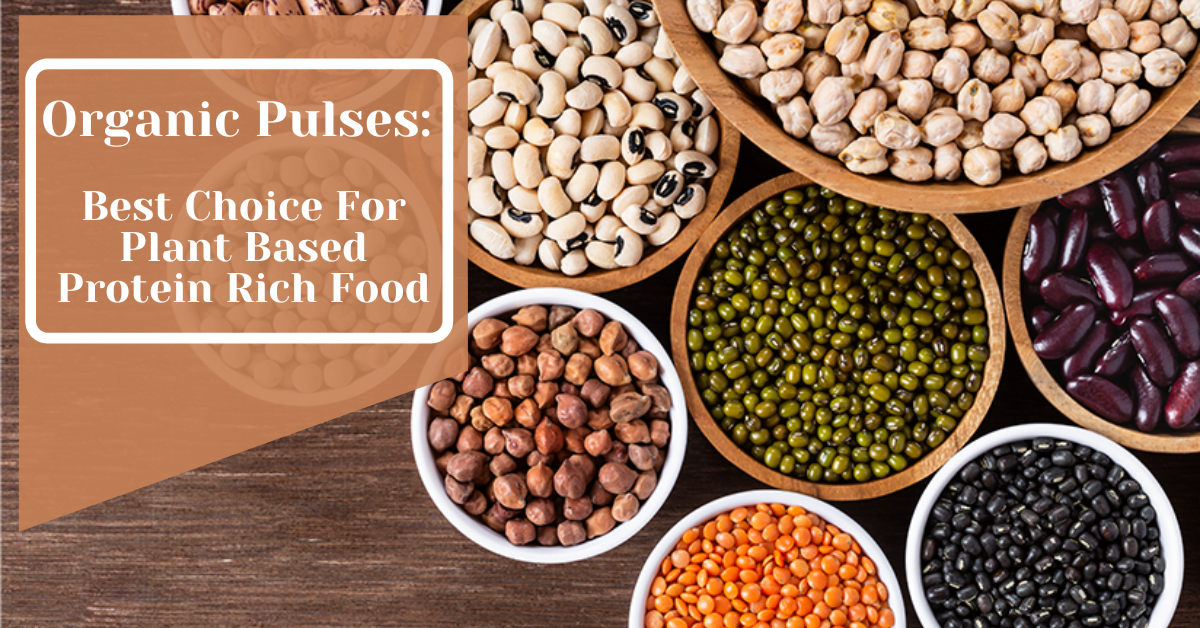What are the health benefits of eating organic pulses?
An organic pulse is healthier than conventional pulses because it contains more nutrients, antioxidants, phytonutrients, and less saturated fat than those treated with pesticides or fertilizers.
Many people in the Western world consume or buy organic pulses online, such as peas and beans, to increase the amount of fiber in their diet and improve gut health. It is high in protein and can be an excellent meat substitute. They are also a good source of iron, potassium, vitamin B6, and magnesium.
Organic pulses provide several essential nutrients that can help combat obesity. Look out these top 7 organic pulses which is the best choice for high and rich protein for living a healthy life:
1) Urad Dal (Black Lentil)
Black lentils are a high-quality plant protein. They are high in iron, potassium, and fiber. They taste great and provide a lot of energy to the body. It is nutritious and rich in protein.
The amino acids present in it make it a complete protein that is very satisfying for vegetarians and vegans and those looking for more whole foods without meat or dairy substitutes.
2) Green Lentils
These pulses are rich in protein, vitamin B1, vitamin B2, iron, and potassium. Also, it contains fiber, iron, folate, and vitamin C. These qualities make green lentils a healthy choice to be included in your diet.
Green lentils are high in protein and can be eaten whole or ground into flour for baking purposes. Lentils also have high folate and dietary fiber levels with little fat content, making them an excellent food choice, especially for people who want to lose weight or maintain weight.
3) Brown Lentils
Studies have shown that eating lentils can help to reduce cholesterol levels and the risk of heart disease. Brown Lentils are a perfect substitute for meat as they provide a rich source of protein without the fat.
It has a lot of essential amino acids, vitamins, and minerals, and Brown lentils should be eaten with rice, wheat, or potatoes as they have a higher carbohydrate content than other pulses.
4) Red Lentils
Red Lentils, also known as masoor dal, is a pulse that can be cooked in a variety of styles, including soups, curries, and salads.
The small seeds are dark red-orange to brownish and have a sweet and earthy flavor. It is high in protein content, with both vegetarian and vegan protein sources available.
It has such as being low in fat, high in zinc and folate, as well as gluten-free. Also, it makes the perfect option for people with allergies to dairy products or gluten sensitivities.
5) Bengal Gram (Chana)
Bengal Gram pulses have a high amount of protein content. It also contains many vitamins and minerals. A handful of Bengal Gram pulses can provide you with 12 grams of protein and 18 grams of fiber with only 130 calories.
The high-fiber content in Bengal Gram pulses reduces the risk of digestive issues such as constipation or excessive gas. It also has low-fat content, which makes it ideal for people who are trying to lose weight.
6) Chickpeas (Kabuli Chana/Desi Chana)
Chickpeas originate from West Asia but have been cultivated since ancient times worldwide for their protein-rich seeds. It is high in protein, fiber and is rich in nutrients. They are also low in fat and calories.
When people think of protein, they usually think about animal products like meat and eggs. However, with meat and egg prices rising, alternatives like chickpeas are becoming more popular.
7) Moong beans
Moong beans pulses for rich protein are healthy and nutritious food. It is a low-fat food, has a low glycemic index, and can help prevent diabetes, obesity, and other health issues. They are pulses that are high in protein, fiber, and several minerals such as iron, zinc, copper, and magnesium.
They also contain other nutrients such as folate, potassium, and vitamin B6. A cup of cooked moong beans provides over 14 grams of protein, about the same amount as in an egg or glass of milk.
What are organic pulses can you use in a salad for rich protein?
Organic pulses such as black beans, cannellini beans, pinto beans, or white beans can be included in your salad as part of the protein content. Organic lentils are also a great alternative to meat in salads. Just make sure you season well with salt and pepper before adding any dressing!
Conclusion: why should you try the vegan diet today?
Veganism is a way of living that takes a compassionate approach to food. It excludes animal products in general and does not use any food for human consumption that either has or may have come from animals. Being vegan is not just about what you eat but also your choices in daily life.
Such as not buying clothes made with animal skins, using cosmetics with animal ingredients, and even using toiletries that contain animal ingredients.
The vegan diet offers many benefits. Such as having lower cholesterol levels and a lower risk of obesity than people who eat meat. It has increased in popularity over the past few years, especially among athletes and celebrities like Ariana Grande, Beyoncé, and many other celebrities.




